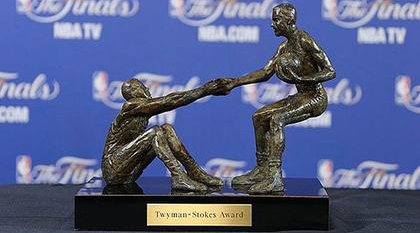
I never met Maurice Stokes. But I met Jack Twyman several times.
The Twyman-Stokes Teammate Award goes annually to the National Basketball Association player who exemplifies friendship to another player. It was first awarded in 2012. Last week, this season’s award went to Milwaukee’s Jrue Holiday.
When I graduated from college, I got a sports writing job at the Rochester, New York, Times-Union, which, like many other afternoon dailies, is no more. Those were during the early days of the NBA and the Rochester Royals had been an entrant.
When I got there, the team had been sold by Les Harrison a year earlier and recreated as the Cincinnati Royals (later the Kansas City Royals and now the Sacramento Kings).
To satisfy what few pro-basketball fans were still left in Rochester, the Cincinnati Royals were still playing a few games there, I suppose against each of the other league teams. So, covering the games wasn’t a major assignment. Give it to the new kid.
I loved it. Unlike today, I could wander into the dressing rooms and interview coaches and players as I wished. I had been told about Maurice Stokes. He had been Rookie of the Year and set the league rebounding record when the team was in Rochester. He continued to be a leading player when the team moved to Cincinnati. However, at a road game, he fell and without a trainer or doctor, was sent back into the game having suffered a concussion.
On the flight back to Rochester, Stokes suffered an attack that paralyzed him. Jack Twyman was the leading Royals player and at those later games that I covered in Rochester, I would always interview Twyman to get an update on Mo Stokes.

There was never anything new. Stokes was still paralyzed, bedridden in Cincinnati. Except he needed someone to step up and take care of his medical and financial bills. Twyman, his teammate and still in his 20s, did just that, becoming his guardian. So, it was to Twyman I always went and he was always obliging.
A half dozen years later, I moved on to the Dayton Daily News in Ohio, this time as executive sports editor. My main boss at the paper was Chuck Glover, who was a sports nut. He knew a lot of people in sports. And he knew Jack Twyman, then of the Cincinnati Royals.
I learned through Glover that Stokes had learned to type by holding a pen in his mouth and had typed his thoughts as he lay in his hospital bed. I told Glover I wanted a copy of Stokes’ writings and, through Twyman, I got it, with the promise that I would not use it before Stokes died.
From Stokes’ account, I wrote a lengthy story, which I stored until April 6, 1970, the date on which Stokes died from a heart attack. He was 36 years old.
My story, which was mainly Stokes’ story, appeared in the Dayton Daily News the day following his death. It was placed across the top of page 1A, entered in the annual basketball feature writing contest and won first place nationally. I received a cash prize of a few hundred dollars, but more importantly, I received a plaque that has since had a favored place on the walls of my various homes.
I’m very proud of that honor. Yet, I could not have written that story without the words of a man who managed to type them with a pen clasped between his teeth. When the Jan. 11, 1966, NBA All-Star game was held in Cincinnati, I attended as a paying customer and spotted Stokes from afar in a wheelchair. It’s the only time I saw him.
There were several coincidences that led to my writing his story: Having my journalism professor at Ohio Wesleyan University, Verne Edwards, land me a job out of college at the Times-Union, where I could cover the pro basketball team. Moving on to Dayton, 50-some miles from Cincinnati, from where I could renew my acquaintance with Jack Twyman, working for a person, Chuck Glover, who was a sports buff, who also knew Twyman. And. of course, obtain the writing of Mo Stokes from which I could write my story from his story.
Those and a few more are all part of my story. It takes more than a writer with some kernels of information to compose a story. I was lucky.






















